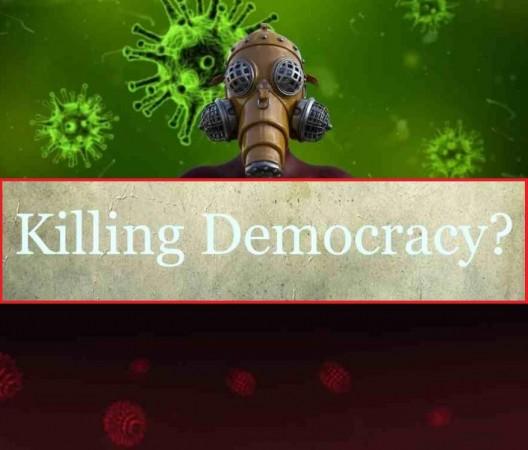The coronavirus outbreak that initially hit a Chinese seafood market has already killed more than 1,14,000 people worldwide. The pandemic killing spree has impacted all course of human lives, and even the democratic system that prevails in world nations is also not spared. In the name of social distancing, most of the legislatures have suspended their activities, and countries like France and Bolivia have postponed elections.
Leaders amassing new powers due to coronavirus outbreak
Even though emergency declarations, nationwide lockdown, and streamlining government decisions are pretty much necessary to prevent the deadly community spread of coronavirus, a section of political experts believe that world leaders will be reluctant to give up these powers they have amassed, even after the containment of coronavirus. They also predict a gradual end to civil rights and liberties which are considered the backbone of democracy.

In the United States, the 9/11 attacks had led to the rise of several emergency measures, and many of them persist even today. The detention center in Guantanamo Bay is still open, and conspiracy theorists allege that the government, with the help of the military, is conducting secret drone killings. Political experts believe that the government will make use of the coronavirus pandemic to curb the rights of the people, in the disguise of protecting the nation from the deadly virus.
"September 11th is the appropriate analogy. We had a fearful public that was willing to countenance a government that was taking steps that undermined civil rights and were difficult to reverse over a long time. I fear that we're entering a parallel period," said Kenneth Roth, executive director of Human Rights Watch, Washington Post reports.
How the pandemic outbreak will kill democracy?
Democracy will not survive if people start losing their role in determining government policies. If free movement and access to information are limited, it will start killing democratic principles in most of the nations.
A pandemic outbreak will result in a restriction to free movement, and accessibility to information will be also very limited. Most of the governments will start claiming that information accessibility is being controlled to lessen public panic associated with the pandemic outspread. Due to social distancing, parliaments will not be able to meet, protests against government policies will not take place in public places.
As tracking a pandemic demands widespread monitoring, many countries seized broad powers to place their citizens under surveillance. In countries like Israel, cell phones of people are being monitored to make sure that coronavirus suspected people are adhering to quarantine rules.
In countries like India where poverty has stricken a majority of the population, prolonged lockdown will create unrest, and due to the unavailability of basic needs, people may enter the streets which will finally cause chaos and anarchy. Even though the Indian government has promised the wellbeing of people in lockdown times, it is still unclear how public servants will effectively distribute living needs to people, especially to those who live in remote regions of the country.
A new system of governance awaits the world?
In the meantime, a section of political experts has started claiming that governments all across the world will make use of coronavirus to gain more control over society. As per these experts, governments will soon roll back the freedom, people have gained over years in the name of COVID-19 containment.
"We have absolutely no reason to believe that the government agencies that are eager to expand their power in response to COVID-19 will be willing to see those authorities lapse once the virus is eradicated," said Fox Cahn, the executive director of the Surveillance Technology Oversight Project.















